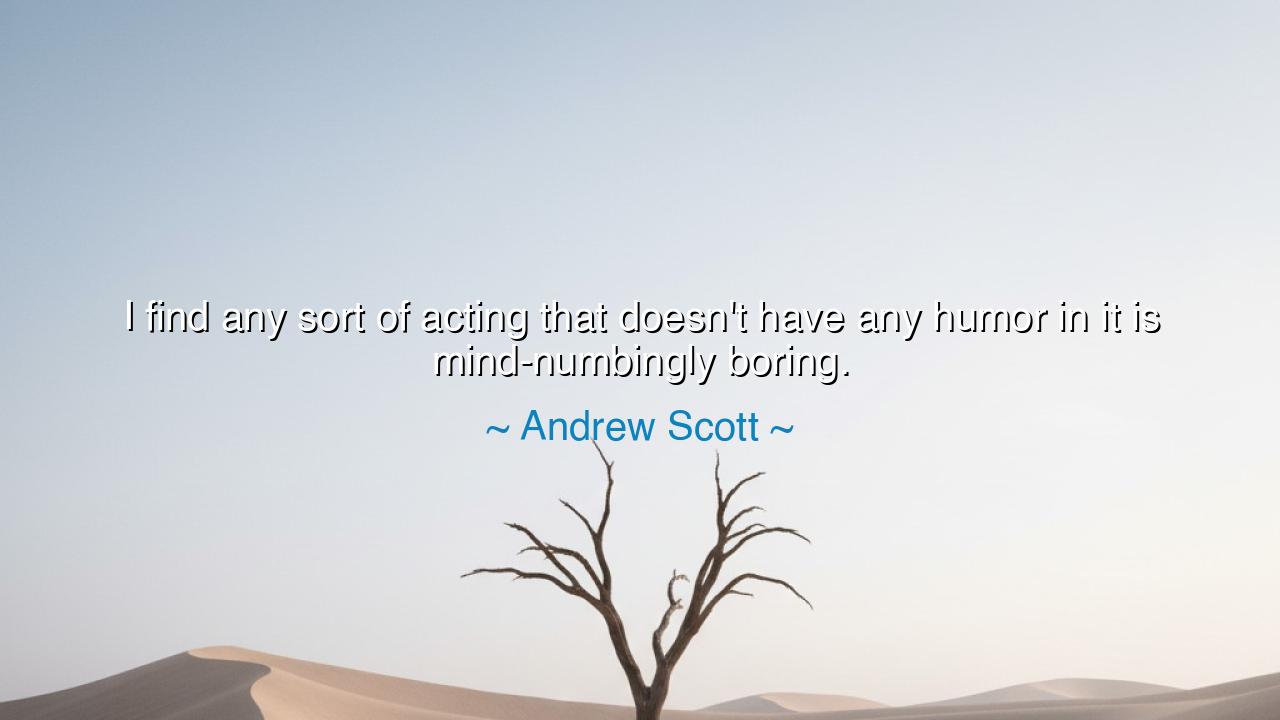
I find any sort of acting that doesn't have any humor in it is






In the grand theater of life, where every individual plays their role upon the stage of existence, there is a powerful truth that actors—both on stage and in the world—understand: without humor, the human experience becomes a dreary and monotonous tale, devoid of the vibrance that makes it truly worth living. Andrew Scott, a master of the craft, captures this truth when he states, "I find any sort of acting that doesn't have any humor in it is mind-numbingly boring." These words reveal the profound connection between humor and humanity, suggesting that without humor, no matter how serious the subject matter, the performance of life—and of art—becomes stale and lifeless.
In the ancient world, where humor was both a reflection of the spirit and a mirror of society, the importance of its role in human existence was widely recognized. Aristotle, the great philosopher, understood that comedy, though seemingly light-hearted, was deeply tied to truth and insight. For Aristotle, humor had the power to expose the absurdities of life, to show the flaws of society, and to provide release from the tensions that come from confronting the darker sides of the human condition. The ancient Greeks, in their playwrights like Aristophanes, used humor to engage their audience with the truths of the world, showing that laughter was not just an escape, but a means to understand the world and ourselves.
Similarly, Shakespeare, the towering figure of the Elizabethan stage, wove humor into his most serious works, creating a balance between the tragic and the comic. In Hamlet, one of the greatest tragedies ever written, the character of the Gravedigger provides moments of wry humor in the midst of death, allowing the audience to reflect on the inevitable nature of life’s end while also laughing at the absurdity of it all. Shakespeare knew that without humor, even the most profound themes of life—such as death, betrayal, and loss—would become too overwhelming, too heavy to bear. Andrew Scott’s reflection mirrors this ancient wisdom: humor is not an afterthought, but an integral part of what makes any performance, or any moment in life, truly dynamic and meaningful.
Consider the story of Socrates, the great philosopher of ancient Athens, whose humor was subtle but ever-present in his dialogues. He used irony to challenge the assumptions of his interlocutors, asking them questions that seemed simple on the surface but led to deeper reflection. His humor was dry, often sarcastic, yet it was never used to mock but to reveal the truths about human nature and society. Socrates understood that life, like a play, could not be fully understood without seeing both its light and dark sides. His humor did not distract from the gravity of his ideas but made them more accessible, more engaging, and ultimately more powerful. This same insight resonates with Scott’s view of acting—without humor, no matter how profound the performance, the truths of the world cannot be fully understood or fully felt.
The ancients also understood that humor is a balancing force, one that allows us to navigate the difficult terrain of human existence. The Spartans, renowned for their discipline and strength, also knew the power of laughter. In times of great battle and sacrifice, humor became a way to alleviate the burdens of war, to strengthen bonds between comrades, and to remember that the human spirit is both resilient and fragile. Similarly, in acting, the humor that Scott speaks of is the key to creating performances that are not just memorable, but meaningful—a way to bridge the gap between the serious and the absurd, between the pain of existence and the joy of being alive.
The lesson here is clear: humor is not a trivial addition to life, nor is it a distraction from the seriousness of the human condition. Rather, it is a vital force, one that brings balance to our understanding of life. Without humor, even the greatest of tragedies and the most profound philosophies lose their grip on our hearts. To understand the world, to truly live within it, we must embrace its contradictions, finding laughter even in its darkest moments. Scott’s insight reminds us that acting, like life itself, must embrace humor in all its forms—subtle, dry, tragic, and comic—so that we may fully understand and experience the complexity of what it means to be human.
In our own lives, we must follow this wisdom: let us embrace humor not as a distraction, but as a means of engagement. When we face difficulty, let us remember that laughter does not deny the gravity of our struggles but illuminates them. Whether in our personal journeys, our work, or our relationships, humor helps us connect, reflect, and endure. Let us not shy away from life’s absurdities but face them with laughter, knowing that it is humor that will allow us to navigate the complexity of existence with grace and wisdom. For, like Scott, we must understand that the best performances—in life and on the stage—are those that find the balance between laughter and seriousness, between joy and sorrow, creating a performance that resonates deeply with the human heart.






AAdministratorAdministrator
Welcome, honored guests. Please leave a comment, we will respond soon